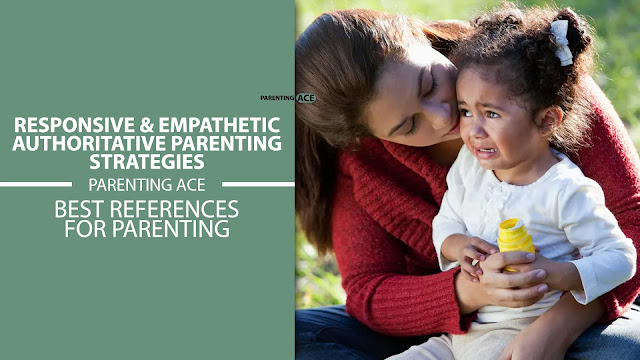Being Responsive and Empathetic: Strategies for Practicing Authoritative Parenting
In the realm of parenting, one approach stands out for its emphasis on empathy, understanding, and balanced guidance: authoritative parenting. At its core, authoritative parenting seeks to strike a delicate balance between responsiveness and setting clear boundaries, fostering an environment where children feel heard, valued, and supported. In this blog post, we explore the profound impact of being responsive and empathetic within the framework of authoritative parenting, unveiling practical strategies for cultivating strong parent-child connections, nurturing empathy in children, and laying the groundwork for their emotional intelligence and resilience. Join us as we delve into the transformative power of empathy in shaping meaningful parent-child relationships and equipping children with essential life skills for navigating the world with compassion and understanding.
 |
| Responsive & Empathetic: Authoritative Parenting Strategies |
Parenting is a journey filled with myriad challenges and rewards, and adopting an authoritative parenting style can significantly impact a child's development and well-being. Authoritative parenting is characterized by a balance of warmth and responsiveness combined with reasonable levels of control and discipline. This approach fosters a nurturing environment where children feel valued, understood, and supported, while also learning important life skills and boundaries. In this article, we delve into the principles of being responsive and empathetic within the framework of authoritative parenting, and explore practical strategies for implementing these principles effectively.
Understanding Authoritative Parenting
Before delving into specific strategies, it's crucial to understand the fundamental principles of authoritative parenting. Unlike authoritarian parenting, which tends to be rigid and controlling, or permissive parenting, which lacks structure and boundaries, authoritative parenting strikes a balance between warmth and control. It involves setting clear expectations and rules while also being responsive to children's needs and emotions.
Being Responsive: The Key to Effective Parenting
One of the cornerstones of authoritative parenting is responsiveness. Being responsive means tuning in to your child's emotions, needs, and cues, and addressing them in a supportive and empathetic manner. This fosters a strong parent-child bond built on trust, understanding, and open communication. Here are some strategies for practicing responsiveness:
- Active Listening: Take the time to listen attentively to your child without interrupting or rushing to provide solutions. Validate their feelings and show empathy by acknowledging their experiences.
- Validate Emotions: Help your child recognize and label their emotions, and reassure them that it's okay to feel a certain way. Avoid dismissing or belittling their feelings, even if they seem trivial to you.
- Be Present: Make an effort to be physically and emotionally present for your child, especially during times of distress or uncertainty. Offer comfort, reassurance, and guidance as needed.
- Empathize: Put yourself in your child's shoes and try to understand their perspective. Empathy allows you to connect with your child on a deeper level and respond to their needs with compassion and understanding.
- Encourage Open Communication: Create a safe and non-judgmental environment where your child feels comfortable expressing their thoughts, feelings, and concerns. Encourage open dialogue and be receptive to their ideas and opinions.
Fostering Empathy in Children
In addition to being responsive, authoritative parents also strive to instill empathy in their children. Empathy is the ability to understand and share the feelings of others, and it plays a crucial role in developing healthy relationships and social skills. Here are some ways to foster empathy in children:
- Model Empathy: Children learn by example, so demonstrate empathy in your own interactions with others. Show kindness, compassion, and understanding towards family members, friends, and even strangers.
- Teach Perspective-Taking: Encourage your child to consider things from another person's point of view. Help them understand that everyone experiences emotions differently and that their actions can impact others.
- Practice Problem-Solving: Empower your child to find constructive solutions to conflicts and disagreements. Encourage them to brainstorm alternative perspectives and consider the feelings of others when resolving conflicts.
- Expose Them to Diversity: Expose your child to people from diverse backgrounds, cultures, and experiences. Encourage them to learn about different perspectives and empathize with individuals who may be different from them.
- Encourage Acts of Kindness: Praise and reinforce acts of kindness and compassion in your child. Whether it's sharing toys with a friend or comforting a sibling, acknowledge and celebrate their empathetic gestures.
In conclusion, being responsive and empathetic are essential components of authoritative parenting, which emphasizes a balance of warmth, responsiveness, and reasonable control. By tuning in to their child's emotions, needs, and perspectives, authoritative parents can foster a supportive and nurturing environment where children feel valued, understood, and empowered. By implementing strategies for practicing responsiveness and fostering empathy, parents can cultivate strong parent-child relationships and equip their children with essential life skills for navigating the complexities of the world with empathy, compassion, and resilience.



Comments
Post a Comment